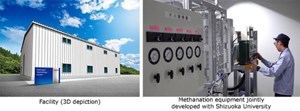News
New hydrogen energy verification testing facility to be established at Morimachi factory
Yamaha Motor Co., Ltd. will build a new verification testing facility equipped with a melting furnace and heat treatment furnace using H2 gas at its Morimachi Factory (Morimachi, Shuchi-gun, Shizuoka Prefecture).
From 2025, we will begin development and verification of technologies and techniques for melting aluminum alloy using H2 gas, as well as comprehensive verification testing for requisite facilities, equipment, and more. By the end of 2026, we plan to complete the development of technologies for melting aluminum alloy and heat-treating cast parts using H2 gas and to gradually implement them at our domestic and international casting factories from 2027 onward.
This verification testing is part of Yamaha Motor's efforts to minimize Scope 1 CO₂ emissions across the lifecycles of our products. In the manufacture of cast parts for motorcycles, outboard motors, and other products, natural gas and other fossil fuels are currently used to provide the thermal energy required for melting aluminum alloys. In our search for alternative energy sources, we judged that electrification is not suited for the melting process in terms of energy efficiency, as it requires a large amount of heat, so we turned our attention to H2 energy, which Yamaha Motor is already studying as an option for reducing Scope 3 emissions.
The verification testing itself will include examining the influence H2 gas has on quality and developing temperature control techniques using H2 burners. We are also considering the introduction of equipment for producing green H2 and methanation equipment (through joint research with Shizuoka University) to produce eMethane without needing external heat sources. Yamaha Motor will work to develop equipment for producing H2 gas at low cost as well as technologies for capturing and reusing the CO₂ in exhaust gases.
Yamaha Motor, in line with its Yamaha Motor Group Environmental Plan 2050, is working toward being carbon neutral throughout all of its supply chains, including the company's business activities by 2050. Furthermore, with Scope 1 and Scope 2 emissions, we have accelerated our plans to achieve carbon neutrality at our manufacturing sites, including at group companies, by 2035 and are ramping up our efforts to that end.


